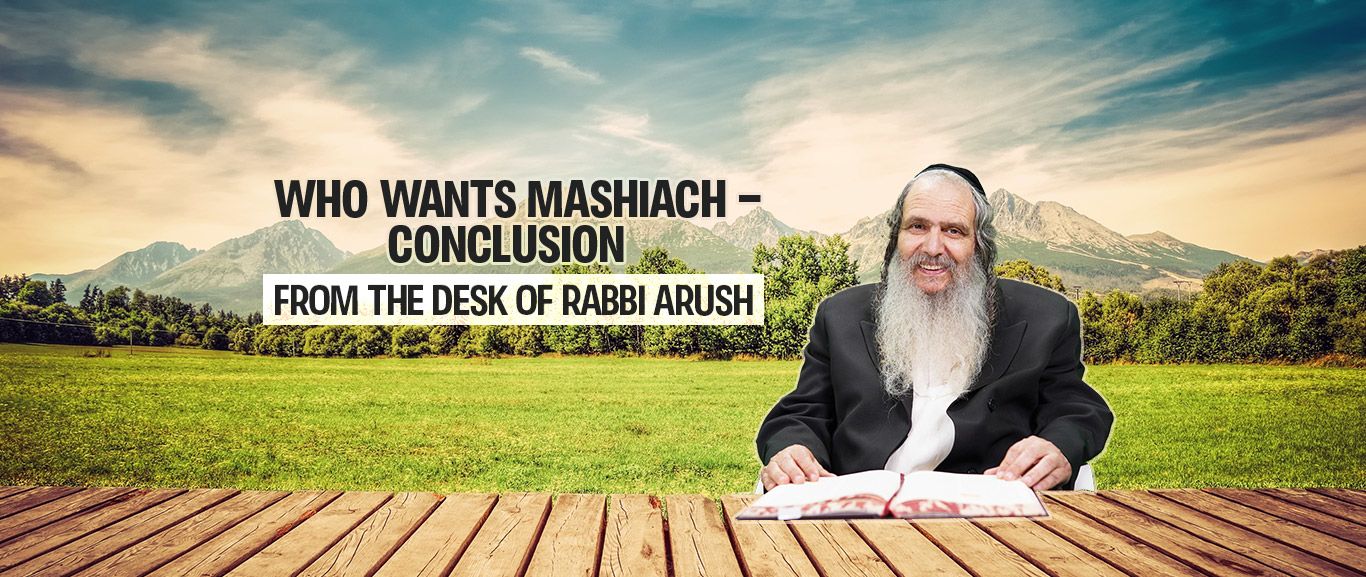
Who Wants Mashiach – Conclusion
Who needs the Mashiach? Not the Jews! Rabbi Arush explains that the nations of the world need Mashiach to recognize Hashem’s greatness and to honor Him.

Joy and rapture reigned in the town of Tsanz. It wasn’t every day that such an important visitor came by. Tsanz was filled with enthusiastic chassidim and servants of Hashem who were also Torah luminaries. They saw the tzaddik, Rabbi Yosef of Neustadt, who was staying in the town as a treasure of Torah and wouldn’t miss even a moment of being with him, drinking his words with great thirst, overjoyed with every word he said. People were asking and expressing interest, and then etching his response in their hearts.
Rabbi Yosef of Neustadt was the son of the famous tzaddik, author of the book Maor vaShamesh, a disciple of Rabbi Elimelech of Lizhensk, author of Noam Elimelech. He learned primarily from his father and other tzaddikim of the generation, but when still a child he went with his father to the Chozeh of Lublin, who was Rabbi Elimelech’s successor.
When Rabbi Yoseleh wanted to describe to the chassidim of the town of Tsanz the extent of the spiritual light and revelation of the Shechina experienced with the Chozeh of Lublin, he said thus: There were four hundred Jewish peasants who had Ruach Hakodesh, in other words, these Jews were living in the villages of the non-Jews, had taverns and were always among the most vulgar non-Jews, and it is safe to assume these Jews were not on a high spiritual level – and in spite of that, thanks to their holy rabbi, they reached the level of Ruach Hakodesh!
Rabbi Yoseleh wanted to demonstrate the Chozeh’s high level, that if he could raise even the lowest Jews and have them cleave to the light of the truth, and so to elevate them to the level of Ruach Hakodesh, how much more so his great disciples and the Torah scholars, his holy group, whose level one can’t even assess.
One of the chassidim in Tsanz was bewildered by what he heard, and asked: “If there was a revelation of the Shechina, and if you were all together – so many tzaddikim in such a holy gathering – why didn’t you act to hasten the coming of the Mashiach?
Rabbi Yosef of Neustadt didn’t hesitate for a moment and startled everyone there with his answer:
“We didn’t feel any need for it!”
All those who heard this reply were shocked. Rabbi Yoseleh was a symbol and a paragon of a chassid who is completely immersed with fear of Hashem and burning with the fire of pure and refined chassidut, and all his feelings were wonderfully exacting. And he wasn’t saying this only in his own name, but rather was describing the general feeling that was in Lublin, in the shadow of the Chozeh.
What’s happening here?! We are talking about extremely holy people, the lowliest of which had Ruach Hakodesh. And all those tzaddikim didn’t have the simple Jewish feeling of wanting and yearning for the coming of Mashiach?! That is unbelievable!
The Tsanz-Klausenburger Rebbe, who heard this story from his father, concluded: “These things are a frightening idea, and it is a very, very deep issue.” The Tsanzer Rebbe was a gaon (brilliant), he was diligent and delved very deeply into Torah. When he says that the issue “very, very deep” – we ought to pay attention to it, since it is a matter of pnimiyut (deep, internal meaning) within pnimiyut.
He explains that of course all that tzaddikim want from the coming of Mashiach is not material wealth and honor, and not even an end to their troubles, rather, all their desire is to serve Hashem yitbarach in peace and quiet. The problem with the galut (exile) is that the yoke of the non-Jews and the yoke of exile prevent Jews from serving Hashem.
But around the Chozeh of Lublin, where holiness illuminated and shone like a midday sun – whoever wanted to cleave to Hashem, immediately received the most sublime connection, and no one felt any exile or hiding of the face, or any obstruction. Therefore, they didn’t feel any lack in the absence of Mashiach and they had no need to hasten his coming.
But one might ask: Didn’t they pray for the coming of Mashiach and for the geula (redemption)?
He explains that of course they prayed, but not for their sake at all, rather only for the honor of Hashem Yitbarach, that His name should grow exalted and sanctified.
According to this, we can explain deeply why they didn’t see the need to hasten the coming of Mashiach: Since all their request for the Mashiach and the Geula was for the revelation of Hashem’s honor – and around the Chozeh, Hashem’s honor was evident and felt in the air, and there was no lack in the revelation of Hashem’s honor, therefore they couldn’t sense the what was lacking in being the Galut and having no Mashiach.
This is the fifth article in the series of articles about praying for the coming of Mashiach. We have brought various angles of this issue so that we can understand truly what the coming of Mashiach is, and what we are waiting for. I thought that what I wrote was very vehement, and then from Heaven I happened to see something brought in the name of the Klausenburger Rebbe, which is much more vehement than I could imagine. His words are frightening, to the point that it’s scary to write them.
We, the Jewish people, don’t need the coming of the Mashiach for ourselves. Everything that can be reached during the Yemot Hamashiach and the Geula and in the Beit Mikdash (Temple), can be achieved in our days as well, no difference at all, by connecting oneself to tzaddikim and engaging in true service of Hashem. That’s why we don’t need the Mashiach for ourselves at all!
“But in the world and especially among the nations of the world, there is a great hiding of Hashem’s honor. The nations don’t know and are not familiar with Hashem, and of course they are far from honoring Hashem – and for that a Mashiach is needed. So, we see that the Mashiach is not coming for us at all, but for the nations! As it says, “until Shiloh arrives, and his will be an assemblage of nations.” So that all the nations will recognize Hashem’s greatness and see the Jewish people honored.
But we, the Jews, don’t need anything; we have no need for the Mashiach, as Rabbi Yosef of Neustadt said, we know everything now already, before the coming of Mashiach.
And now, what Rabbi Natan said, “My Mashiach has come already” – receives extra validation. Rabbi Natan, who was privileged to be close to Rabbeinu, who knew how to impart divine ideas to the simplest people, and, of course to his disciple, the tzaddik, gaon and holy one – certainly all the sayings of Chazal applied to him; that someone who has de’a (wisdom), it is as if the Beit Hamikdash was built in his days. And certainly, he experienced Hashem’s honor and kingship and emuna in a complete and perfect way. And, certainly, anyone who wanted could cleave to Hashem yitbarach and achieve tremendous elevation like in the times of the real Geula. If that was so, they had no need for a Mashiach for their own needs, but only for the world’s needs, for they were far from all this.
That is why Rabbi Natan said: “Mashiach tziddkeinu will reveal our greatness and glory.” We already know our greatness and our high level and the high level of the holy Jews, but the Mashiach will come and will reveal to the world the honor of the Heavenly kingship and the honor of the Hashem’s people who are privileged to crown him as their king and serve Him truly.
With these words we are completing and summing up this wonderful series of articles, which explain why we “shouldn’t” pray for Mashiach, or, more accurately, what are the necessary introductions needed by someone who wants to pray about the Mashiach – what is the Mashiach, what does that mean, what is our intention in praying and what are we praying for, and what is the proper way to approach a prayer for the coming of Mashiach, and what are we looking forward to so much.
There is no more suitable conclusion for this than the holy words of the Rambam, with which he completes the Mishne Torah:
“The Sages and the prophets did not yearn for the times of the Mashiach in order to have dominion over the entire world, to rule over the gentiles, to be exalted by the nations, or to eat, drink, and celebrate. Rather, they desired to be free to involve themselves in Torah and wisdom without any pressures or disturbances, so that they would merit the world to come…. In that era, there will be neither famine nor war, envy nor competition, for good will flow in abundance and all the delights will be freely available as dust. The occupation of the entire world will be solely to know G-d.
Therefore, the Jews will be great sages and know the hidden matters, grasping the knowledge of their Creator according to the full extent of human potential, as it says: ‘The world will be filled with the knowledge of G-d as the waters cover the ocean bed.’”1
1 Mishne Torah, Book of Judges, Laws of Kings and Wars, Chapter 12, Halachah 4.



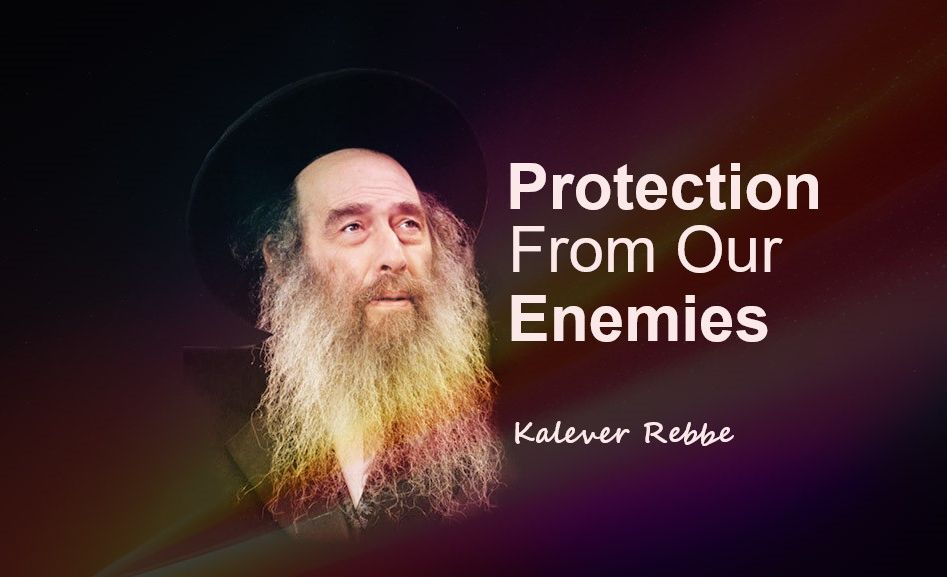
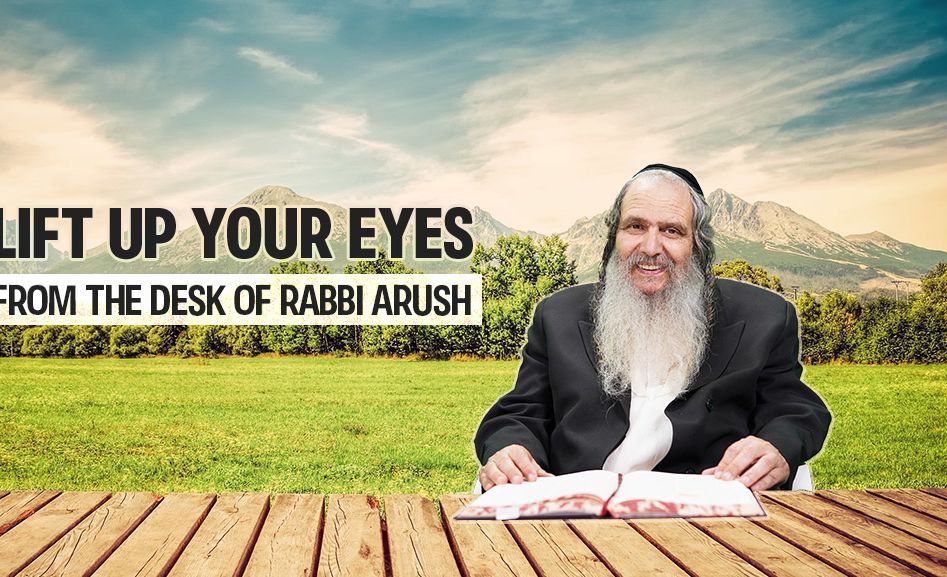




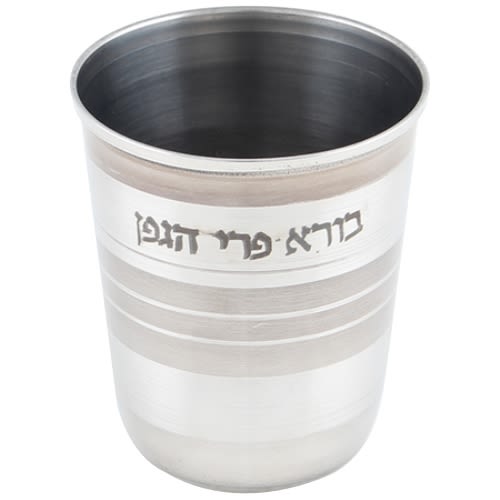

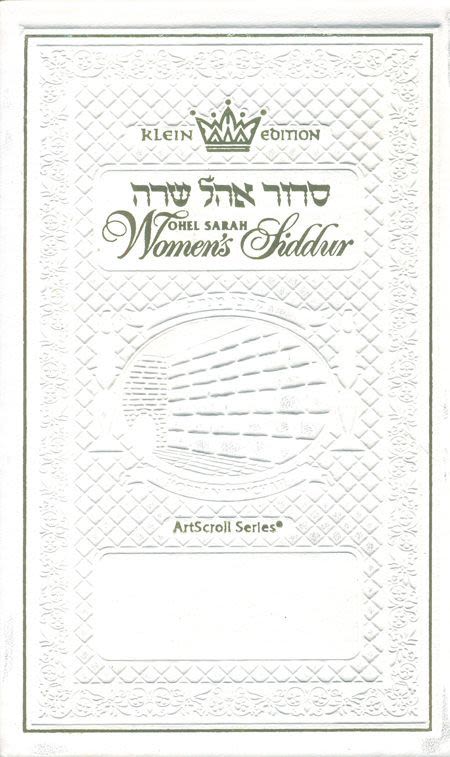
Tell us what you think!
Thank you for your comment!
It will be published after approval by the Editor.